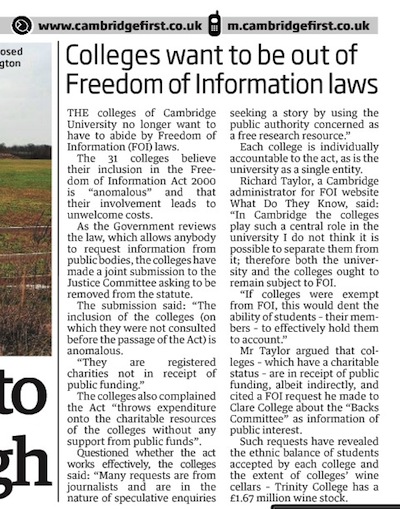
Earlier this week Cambridge First asked me if I would comment on lobbying by the colleges of the University of Cambridge who are asking the government to exempt them from the Freedom of Information Act.
I said:
Cambridge University is defined as public body subject to the Freedom of Information Act, I think that is right as it plays a key role in controlling access to professions, it also receives large amounts of public funding.
In Cambridge the colleges exercise many of the university’s core functions, for example they have a major role in student admissions. Good standing within, and support of, a college is required for entering exams and receiving degrees. In Cambridge the colleges play such a central role in the university I do not think it is possible to separate them from it, therefore both the university, and the colleges, ought remain subject to FOI.
The colleges argued in their submission to MPs carrying out the Justice Committee’s post-legislative review of FOI that they are not in receipt of public funding. This isn’t really accurate as college fees and charges are paid by publicly funded research students who have no choice in the matter if they wish to work at the university. While such funding may reach the colleges indirectly it is still public money. In any case being in receipt of public money isn’t the main thing which makes the colleges public bodies.
As an example I personally made a FOI request to Clare College for papers of the “Backs committee” which has significant influence over large amounts of publicly accessible and publicly viewable open space in Cambridge. Representations from the committee have also been made to the City Council in relation to how public open space under the council’s control is managed. I think that’s an example of the kind of information which ought be easily accessible to members of the public seeking it.
The student media and students’ unions within Cambridge University have extensively used FOI to obtain information from colleges on subjects from ranging from levels of rents to college disciplinary proceedings and colleges’ investment policies. The information released has been used to try and improve the institution’s practices. If colleges were exempt from FOI this would dent the ability of students, their members, to effectively hold them to account.
This quote, along with the colleges’ submission to the post-legislative review of FOI (p367 of the compendium of evidence (PDF)) formed the basis for an article which appeared on p7 of today’s Cambridge First newspaper.
Regulation
One aspect of the colleges’ arguments which I did not address was their first point of their submission which states:
The inclusion of the Colleges (on which they were not consulted before the passage of the Act) is anomalous. They are registered charities not in receipt of public funding. They are not higher educational institutions as defined in the Further and Higher Education Act 1995. They are subject to the regulatory jurisdiction of the Charity Commission, and are not within the remit of the Higher Education Funding Council for England.
This is all utterly spurious and irrelevant to the question of being subject to FOI. It is true the Higher Education Funding Council is not the “principle regulator” for the colleges whereas it is for many other Higher Education Establishments however I can’t see how this is anything other than an obscure technicality which means the Charities Commission has to consult with HEFCE (under a MoU) before acting with respect to most higher education institutions, but this isn’t true in respect of Cambridge Colleges.
The relevant webpages on the The Higher Education Funding Council for England website and from the Charities Commission are not particularly enlightening on the subject of for example, what kinds of things the commission might investigate in respect of the colleges or how it might regulate them, as far as I can see though their involvement would not extend beyond ensuring compliance with charities law.
3 responses to “Cambridge Colleges Seek FOI Exemption”
It’s only 1953 now, and your post is not due to be published for another 50 minutes. However, being highly prescient, I believe it’s an excellent post, with which I agree. That the colleges of one of the most important institutions in the land should seek to avoid public accountability is a very simple and obvious disgrace.
Surely your request for information on the Backs Committee would have to be released to you anyway, as it is environmental information and therefore covered by the Environmental Information Regulations, which have a reach well beyond public authorities like Universities? They would be covered even if not subject to FOI. But I agree they have a public function and therefore should be subject to the transparency requirements of the Act.
Cambridge First has today placed their article online.